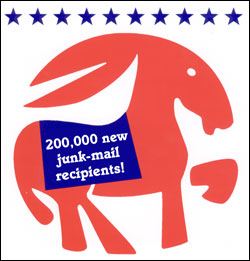LAST SATURDAY, Feb. 7, I did something I’ve never even considered doing. I showed up at a Democratic Party event. The occasion was the Democratic presidential caucus, and I wasn’t the only newbie. In my precinct?with just over a dozen attendees, one of the smallest of the 15 precincts that met at the Central Area Senior Center?only two or three had ever gone to a caucus before. In the social hall at the center, a space that generously holds 150 or so people, about three-fourths were standing, tables and chairs having filled early.
My first observation as folks crowded into the senior center was how white everyone was. Here we were, in the heart of the Central District, in a facility that specializes in services for elderly African Americans, and out of the many hundreds in the room, a couple dozen were nonwhite. The CD is gentrifying, but not that much. This was also a testimony to who was and wasn’t willing to spend two hours at a political party event on a Saturday. On a day when the unifying theme was the desire to beat President Bush, the political constituency that almost unanimously voted against him four years ago was conspicuous by its absence on its own ideological and literal home turf.
BEYOND THAT? It was noisy, messy, and full of a lot of people who weren’t clear how it was all supposed to work, yet somehow it did. In less than two hours, even the largest, most contentious precincts had all sorted out which volunteers would become delegates or alternates, representing which candidates, for the next level of party organizing (scheduled for early May, in a process that will eventually send delegates to the national convention in Boston). Afterward, those who wanted to could stay to consider resolutions. I didn’t.
My precinct gathering was more than anything reminiscent of last year’s neighborhood antiwar groups: Politics was the device whereby city dwellers belatedly met their neighbors. Beyond Bush bashing, the conversation (while the precinct officer and secretary tried to figure out the rules) included: who lived in which apartment building, whether to rent or own, a great local gym, and the need for a good new breakfast cafe in the neighborhood. This was not the revolution.
Beyond the social perks, it’s hard to see why voters would want this process. With Washington’s open primary system struck down by the courts (and likely to stay that way on appeal), this is the wave of the future. In areas like Seattle and everywhere east of the mountains, where one party controls almost all the elected offices, the party also controls the voting experience. And voters, in order to participate in a nominating process, must declare themselves a party member.
THAT MEANS FAR fewer people participate. The record numbers Saturday, perhaps 200,000 statewide, still represent only one out of 20 eligible voters. It essentially gives the vote only to people who have the time and motivation to participate. In an era in which the electoral trend is toward reforms (like voting by mail) that make voting easier and elections more participatory, this moves things sharply in the wrong direction. At the end of the day, what I got for my experience?beyond a good tip on a gym, a paper cup of orange juice, and the chance to vote publicly rather than by secret ballot?was the same privilege of having my vote count that a primary election would have offered. Only it took two hours rather than five minutes.
You can see instantly why the Democratic Party?and, next month, the Republicans, as well?like this system. The Democrats now have 200,000 mostly new names, addresses, phone numbers, and e-mails to put on their fund-raising and phone-bank lists. A significant number of us volunteered to return (as delegates or alternates) for the next, all-day event. And these are folks who’ve already invested a couple hours of time and were willing to make the mental leap of identifying publicly with a party?even though many, like me, don’t consider themselves even remotely loyal to the Democratic Party, or loyal beyond Nov. 2, anyway.
BUT IN THIS brave new electoral world, there is no room for the independent, and there’s plenty of subtle pressure to get with the herd?hence, John Kerry’s ascendance. Last I checked, elections were supposed to be run so as to best exercise our democratic rights?not for the fund-raising and organizing convenience of the major parties.
It’s no secret that I want Bush out of office. But I do miss my freedom to choose to support whichever candidate and party I favor in privacy, without social or other pressures. The riotous, messy, joyous gatherings last Saturday were certainly participatory, and great party-building exercises. But they were a poor substitute for the secret ballot. And democracy.







